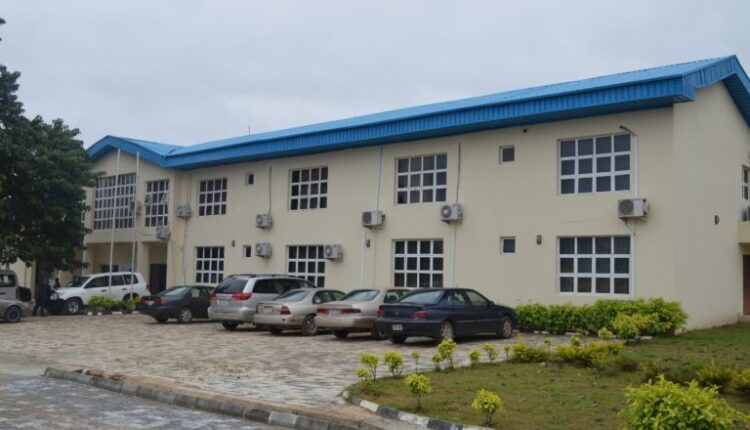ACAN: Incubation of an anti-corruption training institution
|
Getting your Trinity Audio player ready...
|
ACAN administrative building, Keffi
By Anthony Maliki
In many traditional African societies, the principle of sincerity and upholding the truth is a fundamental phenomenon. Doing the right thing at the right time, at all times are key to daily living.
As such, all things are done with honesty of purpose without bias. Persons charged with responsibility carried such within established authority, guidelines and without deviation from laid down norms.
However, with the infiltrations of popular culture from across the world into its fabrics, things are no longer the same in most African societies as honesty is relegated to the background and even persons and institutions meant to discharge duties to the best of their abilities have compromised.
As such, in Nigeria for instance, proactive steps are being taking to correct this anomaly with a conscious effort to right the wrongs and not to allow things to deteriorate the more.
Though the Independent Corrupt Practices and Other Related Offences Commission, (ICPC), was established to help prosecute those that have been found wanting in the discharge of their duties especially in the public sector, the Anti-Corruption Academy of Nigeria, (ACAN), was further set-up as the training and research arm of the Commission.
Situated in Keffi, Nasarawa State, specifically, it was established to facilitate the effective implementation of the Commission’s functions as encapsulated in Section 6 (a–f) of the Corrupt Practices and Other Related Offences Act 2000.
The Academy is intended to primarily equip ICPC Staff with necessary skills and knowledge that would enable them to perform at required levels. Furthermore, it is also designed to provide training for public officers, public servants and the general public on good governance, accountability, transparency, integrity, ethics and all issues relating to corruption and corrupt practices, as well as build up a body of knowledge that will facilitate the development of knowledge-based anti-corruption policies in the country.
The establishment of ACAN is also partly in fulfillment of Nigeria’s commitment to the global initiative to rid the world of the menace, as the Academy is a key enabling instrument required for the successful implementation of the African Union Convention on Preventing and Combating Corruption (AUCPACC) as well as the United Nations Convention Against Corruption (UNCAC).
Indeed, with this, Nigeria has taken its place among the nations that have shown seriousness to tackle corruption under the UNCAC initiative. When the Convention came into force in 2005, it was the first legally binding international anti-corruption instrument, clearly defining corruption in its various forms and setting templates to deal with them through constitutional and legal methods.
Besides, the Convention required signatory nations to implement a wide range of measures in areas such as law enforcement, asset recovery, mobilization of stakeholders and international co-operation, for the overall success of the national and global anti-corruption campaign.
However, the challenge posted by this agenda gave rise to the need for an intellectual and practical support platform to guide, direct and co-ordinate the campaign. That was the background to the establishment of the International Anti-Corruption Academy (IACA) with headquarters in Laxenburg, Austria. IACA was mandated to provide education, capacity building and necessary technical assistance to relevant groups of stakeholders involved in the anti-corruption fight in both public and private sectors. The institution has been delivering on these mandates. Nigeria joined IACA in 2011 while her membership was ratified by the Federal Executive Council in 2012.
Objectives of ACAN
The objectives of the Academy are: To provide world-class law enforcement and anti-corruption education, for top professionals and administrators in the public and private sectors, To transform into an elite institution for law enforcement studies, To become a think-tank for policy formulation and implementation in the law enforcement and anti-corruption sector and To certify competencies of the law enforcement professionals through short-duration courses, in-service training, certificate programmes, diploma courses and post-graduate degree programmes.
Others are To bridge the gap between knowledge and practice through academic research and professional policy analysis, To serve as a platform for dialogue, networking, cooperation and collaboration in crime management and control, To promote best practices, document and publish research findings, and provide efficient library services.
The Philosophy
On the whole, the philosophy of the Academy is that corruption and related crimes can be controlled through robust training and re-training that are grounded in sound policy formulation, operational efficiency, good management culture, behaviour and communication skills that are required to drive a corruption-free society.
The Vision and Mission
The Vision is what drives the Academy “to be a model anti-corruption resource development centre in Africa.” The Mission is “to be a centre of excellence, promoting multi-disciplinary approach to the fight against corruption through Training, Research, Documentation and Advisory Services.”
The Values
An organisation without set values would have no focus. However, ACAN has standard values including, Excellence in service delivery, Innovation in research, teaching and learning, Professionalism in knowledge dissemination and Integrity in conduct and practice.
Programmes of the Academy
The anti-corruption programmes of ACAN include but not restricted to the following: In-House Staff Training Programmes, Post-Graduate Degree, Certificate and Diploma Courses, Thematic Conferences, Seminars and Workshops, Bespoke Training Courses for outside Institutions, Mandatory Induction and Refresher Courses for ACTU members among others. (Additional information from ACAN)


